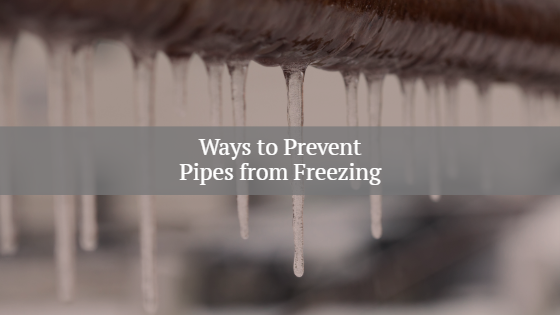
Ways to Prevent Pipes from Freezing
Every year, unpredictable winter weather impacts your life in one way or another. Some welcome the cold temperatures and snow. And others begin their countdown to warmer months. There are plenty of tasks for a homeowner to tackle and adequately prepare for the winter months – heating system checks, preparing the snow blower, and winterizing the lawn mower to name a few. But, one task that often goes overlooked is taking steps to prevent frozen pipes.
Frozen Pipes
Water expands when it freezes and places a significant amount of pressure on what contains it. The expanding water is known to cause pipes to break. The average homeowners’ insurance claim is $10,000 from broken pipes. And 93% of these claims can be prevented with the right precautions in place.
Steps to Prevent
Here are seven ways to avoid frozen pipes and avoid potential disaster.
- Insulate pipes close to outside walls, attics, and in cupboards. These pipes have the greatest chances of freezing before others.
- Drain outdoor water hoses and disconnect from the house.
- Drain swimming pools, hot tubs, and water sprinklers before temperatures drop.
- Turn off water to outside water sources.
- Keep your heat set above 55 degrees, even if you are at work.
- Open cupboard doors and let the heat in! Pipes hidden inside cabinets are locked away from heat.
- Seal leaks in your home – near windows, doors, and close to pipes.
- Let you water drip from the faucet when temperatures drop below 0 degrees.
- Add insulation to your attic.
Steps to Thaw
Not all preventative maintenance always goes according to plan. In the event you find yourself with frozen pipes, follow this plan of action.
- Turn the faucet on and keep it on to allow water to flow once it thaws.
- Use a safe heat source on the section of the pipe frozen. Acceptable sources of heat include hair dryers and heating pads.
- Continue to apply the heat until the water thaws.
- Check every faucet to find additional frozen pipes.
- If you are unsure of anything, call a reputable plumber.
What not to do
No matter what, do not use a blowtorch, kerosene heater, or other unreliable heat sources. You risk starting an uncontrollable fire and losing your home and personal belongings.
To date, the Hanover, Pennsylvania area has had a mild winter. It’s never too late to prepare home for colder temperatures. Preventive maintenance is the key to avoiding potential disasters, minimizing home insurance costs, and avoiding extreme stress.
